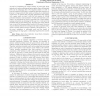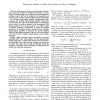205 search results - page 12 / 41 » One-Counter Stochastic Games |
ATAL
2007
Springer
14 years 1 months ago
2007
Springer
It is known that the complexity of the reinforcement learning algorithms, such as Q-learning, may be exponential in the number of environment’s states. It was shown, however, th...
SODA
2010
ACM
14 years 5 months ago
2010
ACM
Stochastic games are a natural model for open reactive processes: one player represents the controller and his opponent represents a hostile environment. The evolution of the syste...
AI
2007
Springer
14 years 1 months ago
2007
Springer
Agent competition and coordination are two classical and most important tasks in multiagent systems. In recent years, there was a number of learning algorithms proposed to resolve ...
ICASSP
2011
IEEE
12 years 11 months ago
2011
IEEE
We start by formulating the resource sharing in peer-to-peer (P2P) networks as a random-matching gift-giving game, where self-interested peers aim at maximizing their own long-ter...
CDC
2010
IEEE
13 years 2 months ago
2010
IEEE
This research concerns a noncooperative dynamic game with large number of oscillators. The states are interpreted as the phase angles for a collection of non-homogeneous oscillator...


